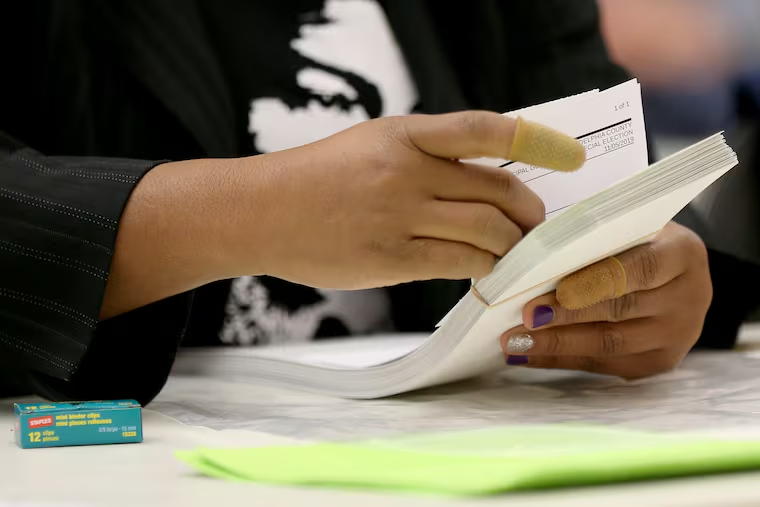Election results in Philly are going to take even longer than expected: Half the votes still haven’t been counted
The outcomes of a number of races in Tuesday’s primary won’t be known for several weeks, and the city may miss a legal deadline for certifying the results.

Philadelphia election officials stopped counting mail ballots Thursday and may not start again for days, warning that the outcomes of a number of races in Tuesday’s primary won’t be known for several weeks and that the city may miss a legal deadline for certifying the results.
The delay is due to the large number of mail ballots voters requested in the last week before the deadline, Deputy City Commissioner Nick Custodio said. He said the commissioners, who run Philadelphia elections, stopped counting them so workers can check poll books to ensure nobody voted twice.
Almost half of the votes cast Tuesday in Pennsylvania’s largest city will remain uncounted until next week.
“The outcomes of some races will not be known for weeks, and the candidates and campaigns should be prepared for that,” Custodio said Friday during a meeting of the city commissioners.
State law requires all votes be counted and certified to the state within 20 days of an election. That might not happen, Custodio said. He said at the meeting that the commissioners would look for ways to improve the process over the next several months “so that we are able to timely certify the November general election.”
» READ MORE: Pennsylvania held an election. We won’t know the results for days. Here’s what that means for November.
Charles M. Gibbs, a Philadelphia attorney whose specialties include election law, said it’s unclear what happens if the city can’t certify its results by the deadline.
“It’s not something that happens very often,” he said. “This is incredibly abnormal, and I don’t know if anyone knows or will know how to handle this.”
The good news, Gibbs said, is that a judge would likely recognize “these are extraordinary circumstances” that require extending the deadline. And because the election was a primary, there’s no risk that a delay in the results leaves an elected seat vacant.
“They had over two months to plan for this election, and they completely failed to plan properly,” said Pele IrgangLaden, the campaign manager for Rick Krajewski, a Democrat running for state representative in West Philadelphia.
» READ MORE: Candidates across Pa. have no idea if they won or lost their primary elections: ‘It sucks’
When elections staff stopped counting ballots Thursday, Krajewski had about 400 more votes than incumbent State Rep. James R. Roebuck — but only 5,869 votes had been counted, with thousands untouched.
Other campaigns were more diplomatic.
“If it takes 30 days for the voters to have their voice be heard, then that is what is required, and we wait,” said Vanessa McGrath, a candidate for state representative in a district that includes parts of Chinatown, Society Hill, and Kensington. “This is an unprecedented level of mail-in votes for Philadelphia, and I think no matter what planning was done in advance, this never could have been predicted.”
Similarly, Mark Nevins, a Democratic political consultant who worked with State Sen. Larry Farnese and state auditor general candidate Nina Ahmad, said, “This is literally a once-in-a-lifetime confluence of events and all we can do is be patient and make sure the count is accurate.” (The Associated Press projected this week that Farnese lost his race against Nikil Saval, while the auditor general race remained too close to call.)
IrgangLaden said he worries about November. Smaller counties, with far fewer votes to count, have essentially already finished. If that pattern repeats in November, he said, it could open the door for unfounded claims of a rigged election. He said he fears President Donald Trump could claim victory for several weeks, and then allege fraud if Philadelphia’s counted votes later take away his lead.
» READ MORE: How does a Republican lead on election night and still lose Pennsylvania? It’s called the ‘blue shift.’
County elections officials have warned for months that election results will take longer than people are used to, because of state law was loosened to allow any voter to vote by mail. The coronavirus pandemic fueled a surge in requests for mail ballots many times larger than expected.
But the delay the commissioners announced Friday was a surprise.
At issue are the books voters sign when they check into their polling places, which were printed two weeks before election day and one week before the deadline for applying for a mail ballot.
Almost 92,000 voters’ mail ballot requests were processed after city poll books were printed. To prevent voters from casting two ballots, anyone who requests a mail ballot is marked in the poll books. Before election day, the commissioners print supplemental lists of those who request ballots after the books are printed.
In theory, poll workers should check both lists. In practice, that may not always happen.
So on Thursday, after the first 14,000 completed mail ballots were counted — those that arrived before poll books were printed — the commissioners stopped and instead had workers scan the poll books to generate a list of people who voted in person.
They’ll then compare that list to the remaining mail ballots. Any voter whose name appears twice will have their mail ballot set aside, to prevent double voting.
Pennsylvania Secretary of State Kathy Boockvar, who oversees elections, said Friday that she supported the decision to check the mail ballots against the poll books.
“We want to make sure that that reconciliation is efficient, effective, and secure,” she said.
Officials believe well-publicized delays sending mail ballots to voters and strict deadlines for voters to send them back may have led some to mail back a ballot and then also try to vote in person — just in case their mail ballots hadn’t arrived in time.
Staff writer Julia Terruso contributed to this article.